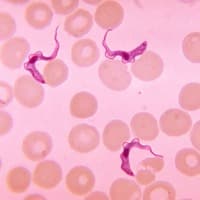Parasitic infection afflicts up to 20 million people worldwide. Most of these people are located in the poorest of nations: Africa, Asia, and Latin America. These diseases are more commonly noted as Leishmaniasis, Sleeping Sickness, and Chagas disease. The parasites responsible for this misery are named Leishmania, Trypanosoma brucei, and Trypanosoma cruzi. These three deadly parasites are responsible for tens of thousands of deaths worldwide every year. If scientists can kill all three parasites with one drug, it will reduce the costs and simplify the treatments.
Few Drugs Available – High Cost of Treatment
Currently, there are only a few expensive and toxic drugs available to combat these diseases. The treatments are deemed impractical by the sheer numbers of patients in poor remote areas, and the necessity of administering the drugs by intravenous drip. To compound the problem of treating so many impoverished people, there is inadequate investment from western drug companies to develop new therapies for these parasitic infections; a sad fact in today’s world of competitive pharmaceuticals.
New Secret Weapon – Selective Inhibitor GNF6702
With the help of funding from the research charity Wellcome Trust, scientists discovered they could alter the genetics of all three parasites with one drug. In the laboratory, they experimented with a few million chemical compounds in the attempt to find the ones that were lethal, and they found one. More research went into super-charging this compound, making it 20 times more potent and then increased the power again by an amazing 400 fold. They had a new secret weapon, a knockout drug called “kinetoplastid proteasome” (GNF6702). This “selective inhibitor” worked so well that it wiped out all three types of parasites from infected lab mice.
More experiments on lab mice are necessary, but what works in mice does not always follow through to humans. The scientists have their work cut out for them, as they must make the drug stable before human testing begins. Fortunately, there is good reason for optimism, though. Researchers have achieved the first steps in developing a new class of antiparasitic medication that could save millions of lives.




